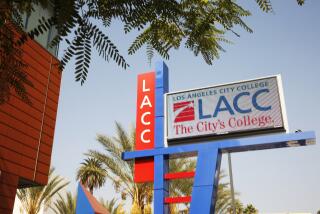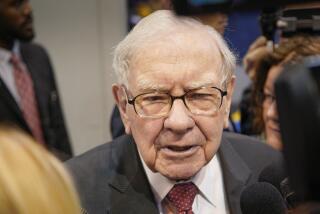This Lottery Only Has Winners, Supporters Say
- Share via
On April 22, a computer will randomly select 40,000 low-income children as winners in a lottery that is already making the leaders of public education nervous.
The winners, 4,000 of whom will be in Los Angeles, won’t get rich. But each will get an opportunity that the rich and the middle class always have enjoyed--the chance to attend private school. That’s because they will be awarded an annual “scholarship” worth $600 to $1,600 for four years toward the cost of tuition.
The source of the scholarships is the Children’s Scholarship Fund, which was set up by two of America’s wealthiest men--financier Teddy Forstmann and John Walton, of the Wal-Mart Waltons. In June, when they announced the effort, Forstmann and Walton each contributed $50 million. Since then, additional donations from them and from others--including Southern California grocery magnate Ronald W. Burkle--have brought the total to about $175 million.
Now, that’s a lot of money and a lot of children. It is triple the 13,000 youngsters nationwide who are already receiving tuition assistance through similar efforts. A total of $60 million has been spent on such private programs since the first one was launched in 1992 by an Indiana businessman.
But Forstmann is not interested just in helping students attend private schools. His real goal is much more ambitious. He wants to undermine the intellectual and emotional hold of what he calls the public school monopoly on the moral middle of America.
In an interview, Forstmann said he is not opposed to public schools, even though he thinks they have imploded and failed to adequately educate most children in urban areas. Nor does he favor private schools, even though he often cites the success Catholic-run schools in New York City have had in graduating most of their students and sending many of them to college.
Rather, he values the wisdom of the marketplace, which he believes will respond to serve parents if they have the power to choose the school that best suits their child. And all parents, he believes, should be able to exercise their free will, not merely the affluent.
“I’m in favor of anything that increases quality through competition,” he said. “It has produced cars, it has produced computers, it has produced jet planes. In education, we’re back in a 1920s Plymouth or something. That’s because of the heavy hand of monopoly.”
*
That argument has been made before, by those religious and political conservatives who want government tuition subsidies. But it has rarely swayed legislators or the public and has remained part of the political fringe.
The opposing arguments go like this: helping students leave the public schools weakens the schools they leave behind; the most capable students would be the first to jump ship; good private schools already are full; and private schools only perform better because they get to choose their students.
Bob Chase, the leader of the National Education Assn. teachers union, attacked the effort in a column he wrote for USA Today, labeling it “a classic example of bait and switch.” And Sandra Feldman, the president of the American Federation of Teachers, said it was worrisome “because there is every indication in history and reality that the market is not especially good for poor people.”
But Forstmann has supporters from across the political spectrum. The fund’s 48-member board of advisors includes civil rights pioneer Andrew Young and the head of the Southern Christian Leadership Conference, Martin Luther King III. It also includes Senate Majority Leader Trent Lott and former Secretary of State George P. Shultz and his wife. Rounding it out are powerful business executives, entertainers, sports figures and religious leaders.
Young, introducing Forstmann at a dinner in Atlanta attended by numerous civil rights leaders, said: “There is no question in any of our minds that this is an idea whose time has come.” He compared it to the early days of the civil rights movement, saying, “Every movement I’ve been a part of has started out as very unpopular and controversial.”
When Forstmann announces the scholarships, he will highlight the tremendous demand the offer generated. “To the moral middle of America, doesn’t that have to say something, if they’re lined up around the corner in every city?”
Despite the overwhelming response, it’s still not too late to enter the lottery. Call (800) 805-KIDS for an application. The deadline is March 31.
More to Read
Sign up for Essential California
The most important California stories and recommendations in your inbox every morning.
You may occasionally receive promotional content from the Los Angeles Times.













